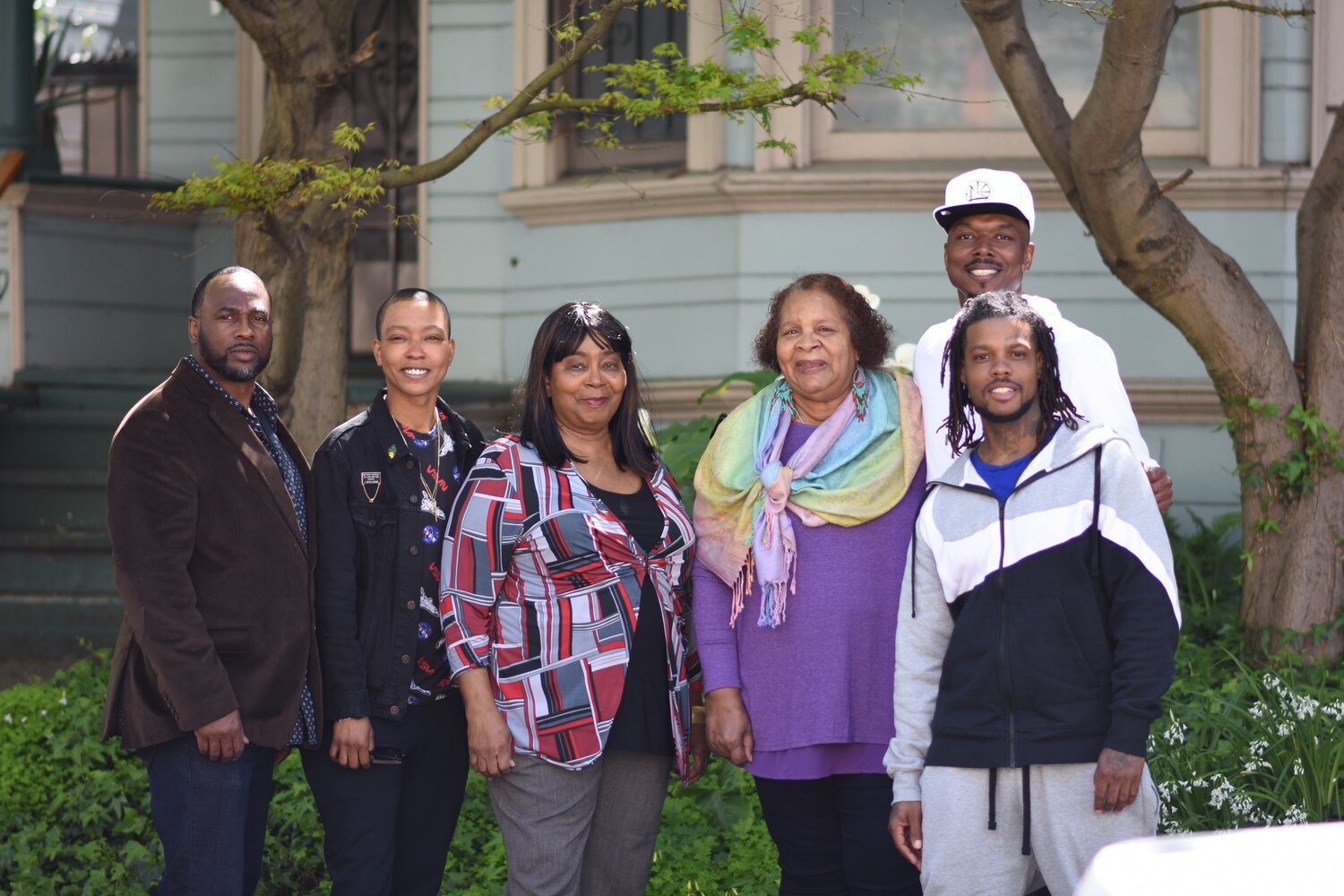Bay Area
Oakland Moves to Prohibit Landlords from Considering Criminal Histories in Rental Housing

Members of the City Council’s Community and Economic Development (CED) Committee this week unanimously adopted a proposed Fair Chance Housing Ordinance that would ban landlords from considering criminal histories in screening applicants for rental housing.
The ordinance is designed to break down a major barrier, beyond high rental costs, that keeps many formerly incarcerated people from finding a place to live for themselves and their families, leading many of them to end up homeless after leaving prison.
A recent survey found that 73% of unhoused residents in Oakland encampments were formerly incarcerated, according to a city report on the proposed ordinance.
The proposal was originally brought to the city by the Alameda County Fair Chance to Housing Coalition, which includes All of Us or None, Legal Services for Prisoners with Children and Just Cities. The coalition worked closely with City Attorney Barbara Parker’s office, which drafted the ordinance and co-sponsors District 2 Councilmember Nikki Fortunato Bas with Larry Reid and Dan Kalb. Also supporting the proposal at CED were Councilmembers Noel Gallo and Loren Taylor.
“The purpose of the legislation is to increase access to housing for formerly incarcerated persons and their family members, to decrease the homelessness and family separation that result from policies that exclude the formerly incarcerated from housing and to provide formerly incarcerated people with a fair opportunity to reclaim their lives and reintegrate into the community,” said Deputy City Attorney Laura Lane.
With a few exceptions, the law would prevent landlords from asking about or requiring the disclosure of an applicant’s criminal history, from advertising or using a policy that excludes people with criminal history or taking any adverse action against a tenant or applicant, based on their criminal history, such as evicting a tenant or charging someone higher rent or security deposit, Lane said.
Fines for a violation could cost up to $1,000 per incident. A violation would be considered an infraction, but knowingly or willingly violating the ordinance would be a misdemeanor. The ordinance provides for education and outreach so that members of the community would know their rights and landlords would know their responsibilities.
“We believe this ordinance is a valuable and immediate solution to the housing crisis,” said John Jones III, who is a staff member of Just Cities and campaign director of the Fair Chance to Housing Coalition.
“This impact does not lie solely with the individual who has a criminal record,” he said. “These barriers are extended to family members, to loved ones, to children.”
People coming out of prison face barriers in all types of housing: publicly subsidized nonprofit housing, the Public Housing Authority and Single Room Occupancy (SRO) residences, said Margaretta Lin, executive director of Just Cities.
In its research, Just Cities “discovered that the criminal background databases that landlords rely on are extremely flawed,” she said. “We also know that there are…extreme racial disparities…in every step of the criminal justice system.
Noting that the city is strapped for resources, Lin said that Just Cities is willing to provide a pro bono annual evaluation of the implementation of the ordinance for the first two years.
Among the other cities that are already acting on this issue are Portland, Seattle, Richmond and Berkeley, she said.
Succatti Shaw, a member staff of All of Us or None and Legal Services for Prisoners with Children, spent five years in prison. She said that because of the way her charges were written, making it seem like she manufactured meth, she is ineligible for affordable housing.
“I have a lifetime ban against me. I served my time, but now I’m serving time because I’m not seen as a human being,” she said. “I’m thanking you all for a chance to house my children (and) myself. We thank you for being stand up men and women.”
Taqwaa Bonner of All of Us or None said, “I am one among thousands of men and women who have been forced to live out in the streets of Oakland. I just served 30 years and two months straight in our California prison system.”
Released three years, ago, he lived in transitional housing for three months and was then “kicked out,” he said.
He said he could not live with his mother because her private apartment complex had a rule against felons living there. “I couldn’t live with my two sisters or my daughter because all three of them have Section 8 housing,” he said.
“I was born and raised in Oakland,” Bonner said. “I have employment in Oakland, (but) I cannot live in Oakland, solely based on my criminal conviction 30 years ago, which had nothing to do with tearing up someone’s property or not paying rent.”
The ordinance is scheduled to be heard on the consent calendar at the Jan. 21 City Council meeting.
Activism
OP-ED: AB 1349 Puts Corporate Power Over Community
Since Ticketmaster and Live Nation merged in 2010, ticket prices have jumped more than 150 percent. Activities that once fit a family’s budget now take significant disposable income that most working families simply don’t have. The problem is compounded by a system that has tilted access toward the wealthy and white-collar workers. If you have a fancy credit card, you get “presale access,” and if you work in an office instead of a warehouse, you might be able to wait in an online queue to buy a ticket. Access now means privilege.

By Bishop Joseph Simmons, Senior Pastor, Greater St. Paul Baptist Church, Oakland
As a pastor, I believe in the power that a sense of community can have on improving people’s lives. Live events are one of the few places where people from different backgrounds and ages can share the same space and experience – where construction workers sit next to lawyers at a concert, and teenagers enjoy a basketball game with their grandparents. Yet, over the past decade, I’ve witnessed these experiences – the concerts, games, and cultural events where we gather – become increasingly unaffordable, and it is a shame.
These moments of connection matter as they form part of the fabric that holds communities together. But that fabric is fraying because of Ticketmaster/Live Nation’s unchecked control over access to live events. Unfortunately, AB 1349 would only further entrench their corporate power over our spaces.
Since Ticketmaster and Live Nation merged in 2010, ticket prices have jumped more than 150 percent. Activities that once fit a family’s budget now take significant disposable income that most working families simply don’t have. The problem is compounded by a system that has tilted access toward the wealthy and white-collar workers. If you have a fancy credit card, you get “presale access,” and if you work in an office instead of a warehouse, you might be able to wait in an online queue to buy a ticket. Access now means privilege.
Power over live events is concentrated in a single corporate entity, and this regime operates without transparency or accountability – much like a dictator. Ticketmaster controls 80 percent of first-sale tickets and nearly a third of resale tickets, but they still want more. More power, more control for Ticketmaster means higher prices and less access for consumers. It’s the agenda they are pushing nationally, with the help of former Trump political operatives, who are quietly trying to undo the antitrust lawsuit launched against Ticketmaster/Live Nation under President Biden’s DOJ.
That’s why I’m deeply concerned about AB 1349 in its current form. Rather than reining in Ticketmaster’s power, the bill risks strengthening it, aligning with Trump. AB 1349 gives Ticketmaster the ability to control a consumer’s ticket forever by granting Ticketmaster’s regime new powers in state law to prevent consumers from reselling or giving away their tickets. It also creates new pathways for Ticketmaster to discriminate and retaliate against consumers who choose to shop around for the best service and fees on resale platforms that aren’t yet controlled by Ticketmaster. These provisions are anti-consumer and anti-democratic.
California has an opportunity to stand with consumers, to demand transparency, and to restore genuine competition in this industry. But that requires legislation developed with input from the community and faith leaders, not proposals backed by the very company causing the harm.
Will our laws reflect fairness, inclusion, and accountability? Or will we let corporate interests tighten their grip on spaces that should belong to everyone? I, for one, support the former and encourage the California Legislature to reject AB 1349 outright or amend it to remove any provisions that expand Ticketmaster’s control. I also urge community members to contact their representatives and advocate for accessible, inclusive live events for all Californians. Let’s work together to ensure these gathering spaces remain open and welcoming to everyone, regardless of income or background.
Activism
Oakland Post: Week of December 31, 2025 – January 6, 2026
The printed Weekly Edition of the Oakland Post: Week of – December 31, 2025 – January 6, 2026

To enlarge your view of this issue, use the slider, magnifying glass icon or full page icon in the lower right corner of the browser window.
Activism
Big God Ministry Gives Away Toys in Marin City
Pastor Hall also gave a message of encouragement to the crowd, thanking Jesus for the “best year of their lives.” He asked each of the children what they wanted to be when they grow up.

By Godfrey Lee
Big God Ministries, pastored by David Hall, gave toys to the children in Marin City on Monday, Dec. 15, on the lawn near the corner of Drake Avenue and Donahue Street.
Pastor Hall also gave a message of encouragement to the crowd, thanking Jesus for the “best year of their lives.” He asked each of the children what they wanted to be when they grew up.
Around 75 parents and children were there to receive the presents, which consisted mainly of Gideon Bibles, Cat in the Hat pillows, Barbie dolls, Tonka trucks, and Lego building sets.
A half dozen volunteers from the Big God Ministry, including Donnie Roary, helped to set up the tables for the toy giveaway. The worship music was sung by Ruby Friedman, Keri Carpenter, and Jake Monaghan, who also played the accordion.
Big God Ministries meets on Sundays at 10 a.m. at the Mill Valley Community Center, 180 Camino Alto, Mill Valley, CA Their phone number is (415) 797-2567.
-

 Bay Area4 weeks ago
Bay Area4 weeks agoPost Salon to Discuss Proposal to Bring Costco to Oakland Community meeting to be held at City Hall, Thursday, Dec. 18
-

 Activism4 weeks ago
Activism4 weeks agoMayor Lee, City Leaders Announce $334 Million Bond Sale for Affordable Housing, Roads, Park Renovations, Libraries and Senior Centers
-

 Activism4 weeks ago
Activism4 weeks agoOakland Post: Week of December 10 – 16, 2025
-

 Activism4 weeks ago
Activism4 weeks agoOakland School Board Grapples with Potential $100 Million Shortfall Next Year
-

 Activism4 weeks ago
Activism4 weeks ago2025 in Review: Seven Questions for Black Women’s Think Tank Founder Kellie Todd Griffin
-

 Arts and Culture4 weeks ago
Arts and Culture4 weeks agoFayeth Gardens Holds 3rd Annual Kwanzaa Celebration at Hayward City Hall on Dec. 28
-

 Advice4 weeks ago
Advice4 weeks agoCOMMENTARY: If You Don’t Want Your ‘Black Card’ Revoked, Watch What You Bring to Holiday Dinners
-

 Activism4 weeks ago
Activism4 weeks agoAnn Lowe: The Quiet Genius of American Couture





















































